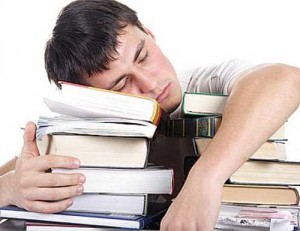Sleep
Sleep is categorized by five stages. The stages are differentiated by how active your brain is.
This can be measured with an electroencephalogram (EEG) that measures brain waves. As you go from stage 1-4, there is a slowing down of brain wave frequency. Throughout a night, you will cycle through stages 1-4 multiple times. Before you return to stage 1 from stage 4, you will enter what is referred to as REM (rapid eye movement sleep). During this time, your muscles are the most relaxed. This is the stage where your brain processes short term memory into long term memory and when your body restores and heals itself. For these reasons, we can understand that sleep is very important for both your physical health and mental well-being. Studies have shown that adequate sleep can improve learning. On the other hand, sleep deficiency may alter some brain function and contribute to decreased memory, difficulty problem solving, mood swings and decreased motivation. The average college student needs 7-8 hours of sleep each night.
Why does my body need sleep?
 Sleep is needed to promote and enhance your physical health.
Sleep is needed to promote and enhance your physical health.
- It is while you sleep that your body can restore and repair damage to heart and blood vessels.
- Your sleep cycle plays a role in insulin and hormone balance, including the hormones that play a role in appetite.
- Studies have shown that teenagers that are sleep deficient have a greater incidence of being overweight.
- Sleep is needed for children and teenagers as it contributes to healthy growth and development.
What happens when I pull an all-nighter?
All of us for one reason or another may pull an all-nighter. Doing this once in a while is not harmful but frequent nights of no sleep are not good. Our brain function becomes diminished particularly in areas such as concentration, decision making, memory and being able to complete tasks. Our reflexes are slowed down which is of particular importance with regards to driving, playing a sport or operating machinery. Prolonged nights of decreased sleep contribute to what is referred to as "sleep debt" which can affect our immune system and make us more prone to illness. Essentially, sleep is as necessary to our body as eating.
Do medicines affect my sleep?
Many medications, both prescription and over the counter, can affect your sleep. Some cold medications with a decongestant, such as pseudoephedrine, cause insomnia. Herbal medications such as ginseng and St. John's wart can also cause insomnia. Cough medications that may contain alcohol decrease your deep REM sleep. For additional information on how medications affect sleep see Harvard Health Publications chart here.
The most common illicit drug used in the United States is marijuana. Studies have been done that have demonstrated that THC (the active ingredient in marijuana) can decrease both the slow brain wave stages and REM stage of sleep. In some animals, THC caused total absence of REM sleep. Due to these effects, it is not surprising that regular marijuana users will have a significantly altered sleep cycle.